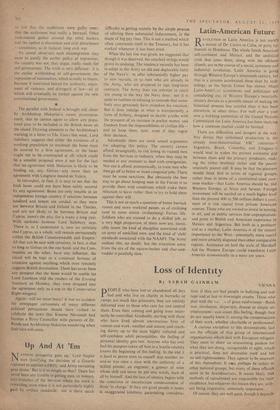STILL BREAK STONE
FT5HE course of events in Cyprus today is being I likened to what happened in Ireland after the Treaty of 1921; justly, as the parallel is close. Trouble has arisen for the same reasons : wherever a nationalist movement is to be found it will contain (as we said in connection with Nyasaland) a broad spectrum of opinion, ranging from moderates to extremists; and if the move- ment is foolishly repressed—if constitutional de- mands are ignored or rejected out of hand—the focus of resistance tends to be found on the extremist wing. The longer the period of repression lasts, the more effectively the extremists can pose as their country's only resource; for they appear to be getting results (however ugly their methods) while the moderates tend to be branded as appeasers'and Quislings.
When an independence movement is long re- pressed the eventual settlement—no matter how reasonable it is on paper—will appear to extrem- ists to be a weak compromise. And in the period of disillusionment that inevitably follows, people begin to realise that the wind blows just as cold in a free country : Parnell came down the road, he said to a cheering man : Ireland shall get her freedom and you still break stone.'
In such circumstances the extremist leaders— de Valera in Ireland, and Grivas today—in- evitably begin to sense the disillusionmeaLand
to feel that the moderates were guilty men: that the settlement was really a betrayal. Other malcontents gather around the rebel leaders, and the upshot is discontent and civil disturbance --sometimes, as in Ireland, long civil war.
To casual observers such disintegration may seem to justify the earlier policy of repression; the country was not, they argue, really ready for self-government. The truth is very different : it is the earlier withholding of self-government, the repression of nationalism, which is really to blame, because it nourished hatred for authority, enjoy- ment of violence, and disregard of law--all of which will eventually be turned against the new constitutional government.
The parallel with Ireland is brought still closer by Archbishop Makarios's recent pronounce- ment, that he cannot agree to allow any popu- lated area to be included in the British bases on the island. Drawing attention to the Archbishop's warning in a letter to The Times this week, Lord Salisbury suggests that either the existence of a working population to maintain the bases must be assured by a firm agreement, or the bases ought not to be constructed at all; which could be a sensible proposal were it not for the fact that no agreement with Makarios is likely to be binding on. say, Grivas—any more than an agreement with Cosgrave bound de Valera.
In retrospect, in fact, it is easy to see that the Irish bases could not have been safely secured by any agreement. Bases are only tenable in an independent foreign country if relations between landlord and tenant are cordial, as they were not between Britain and Ireland in the Thirties, and are not likely to be between Britain and Cyprus, more's the pity, for a many a long year. With sardonic • humour Lord Salisbury says. 'There is, as I understand it, now no certainty that Cyprus, as a whole, will remain permanently within the British Commonwealth and Empire.' All that can be said with certainty, in fact, is that so long as Grivas on the one hand, and the Com- munists on the other, have any influence, the island will be kept in a continual ferment of suspicion against anything which even remotely suggests British domination. There has never been any prospect that the bases would be usable (as Lord Lambton told the readers of the Evening Standard on Monday, they were dropped into the agreement only as a sop to the Conservative Right-wingers).
Again—will we never learn? It was no accident the newspaper cartoonists of many different political persuasions should have rushed to celebrate the news that Kwame Nkrumah had become a Privy Councillor with pictures of Dr. Banda and Archbishop Makarios wondering when their turn will come.



































 Previous page
Previous page